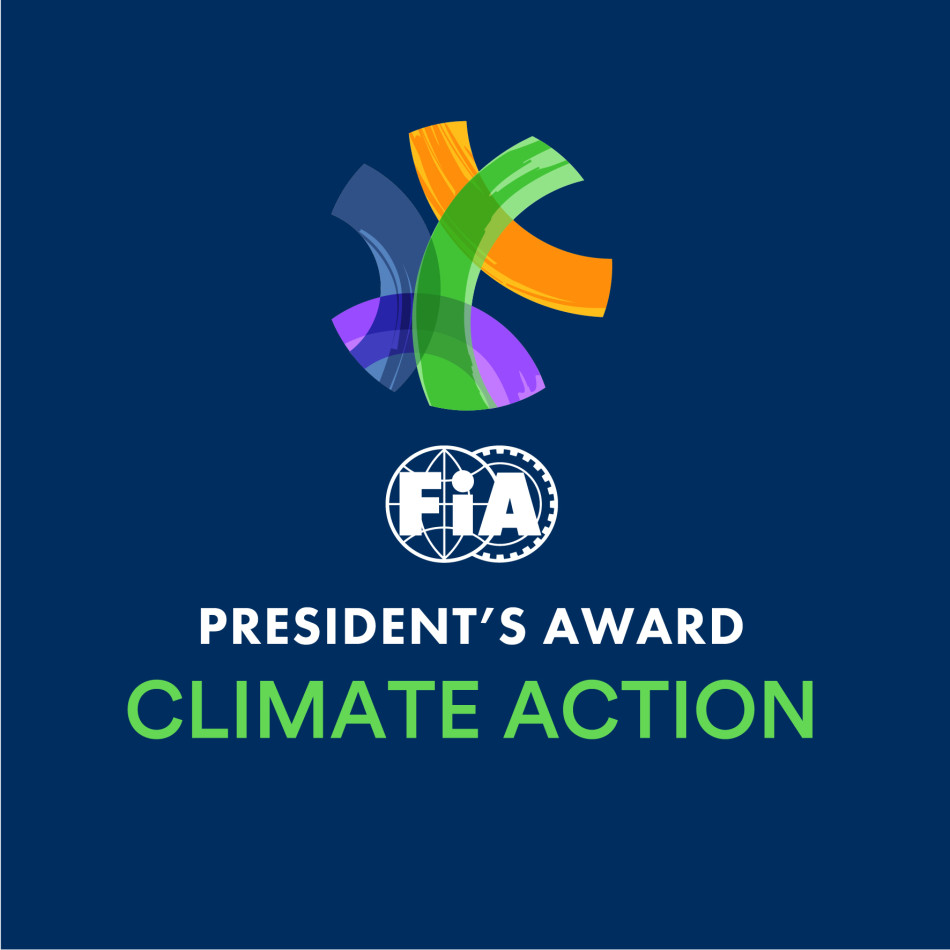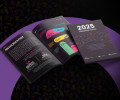BUILDING A SUSTAINABLE TOMORROW: MEMBER CLUBS SUBMIT 10 PROJECTS FOR NEW FIA PRESIDENT’S CLIMATE ACTION AWARD
As part of the new FIA President’s Awards scheme created to honour and celebrate the FIA Member Clubs, whose commitment brings positive change to the FIA community and society at large, the FIA received 10 applications for the Climate Action category.

The FIA President’s Climate Action Award aims to acknowledge innovative solutions, mitigation measures and bold actions that can help Club members and the wider community to tackle environmental challenges. Apart from the public recognition of the work carried out by FIA Member Clubs, the award is also meant to act as a catalyst for other initiatives around the world, uniting Member Clubs in a collective movement that will spark innovative ideas, inspire the FIA community and change mindsets.
The following projects and initiatives were submitted by FIA Member Clubs via the call for applications:
- AUTOMÓVIL CLUB DE GUATEMALA — Clean Mobility in Guatemala
- AUTOMÓVIL CLUB DEL ECUADOR — Smart City Simulation
- SVENSKA BILSPORTFORBUNDET (Sweden) — Motor sport arenas as hotspots for biodiversity
- AUSTRALIAN AUTOMOBILE ASSOCIATION — Real World Testing Programme
- AUTOMOBILE CLUB D’ITALIA (Italy), ALLGEMEINER DEUTSCHER AUTOMOBIL-CLUB (Germany), ÖSTERREICHISCHER AUTOMOBIL-, MOTORRAD- UND TOURING CLUB (Austria) & TOURING CLUB SUISSE (Switzerland) — Countering climate change with Green New Car Assessment Programme (Green NCAP)
- MOTORSPORT AUSTRALIA — Environment Sustainability in the Australian Motorsport Industry
- MOTORSPORT UK — Carbon Reduction Project
- SAUDI AUTOMOBILE & MOTORCYCLE FEDERATION — Saudi Motorsport Vision 2030
- ROYAL AUTOMOBILE CLUB OF JORDAN — Photovoltaic Station
- EASTERN ALLIANCE FOR SAFE AND SUSTAINABLE TRANSPORT — EASST Re-purposing Waste for Road Safety
The winner of the FIA President’s Climate Action Award will be announced during the Annual General Assembly on Friday 9 December.
More detail on the projects received for the FIA President’s Climate Action Award is below:
- AUTOMÓVIL CLUB DE GUATEMALA — Clean Mobility in Guatemala
With its ‘Connect to Clean Mobility’ campaign, the Automóvil Club de Guatemala (ACG) raised awareness of sustainable mobility solutions using traditional media (TV, radio, written press), digital platforms and social media, as well as interviews and media briefings. The campaign’s goal was to educate users and consumers about decarbonisation and electric mobility, and encourage private and fleet vehicle owners to take action to reduce pollution, maintain a clean environment in Guatemala and benefit the economy. ACG joined forces with AMEGUA (Electric Mobility Association of Guatemala) to give credibility and help disseminate key messages, as well as to publicise the benefits of the Electric Mobility Incentives Law, which was made official in August 2022. Supporting the ‘Vision Zero’ initiative, ACG encouraged key stakeholders to commit in order to accelerate the transition to electric mobility. They also initiated contacts to create a network of forums to generate discussion on clean mobility.
- AUTOMÓVIL CLUB DEL ECUADOR — Smart City Simulation
In order to promote more environmentally friendly transport in Ecuador and its surrounding region, the Automóvil Club del Ecuador (ANETA) has developed a "Smart City Simulation" in Cumbayá. The main objective of this project is to demonstrate that cities in Ecuador can incorporate technological elements and efficiency measures to reduce their carbon footprint. ANETA has installed solar panels on the roof of its driving school to generate clean energy for its buildings and electric vehicles, covering all of the school’s energy demand and having a surplus which is injected in the public grid. Students also have access to driving simulators to learn through practice, and an internal track with traffic elements. The electric vehicles allow students to practice their driving skills, get familiar with the electric technology and understand how it can contribute to the preservation of nature and air quality.
- SVENSKA BILSPORTFORBUNDET (Sweden) — Motor sport arenas as hotspots for biodiversity
Promoting biodiversity is one of United Nations´ top environmental goals in Agenda 2030. Svenska Bilsportforbundet (SBF) is participating in a scientific study that builds on previous research showing that motor sport arenas contribute to the conservation of biological diversity. SBF visited its Clubs to see how their activities were contributing to the conservation and development of biological diversity. Thanks to a grant funding it received from the FIA, SBF was able to research this more thoroughly in 2022 on three chosen tracks around Sweden by measuring species richness. Preliminary results show that SBF’s motor sport arenas have higher biodiversity than the surrounding areas. The final report is due to be published in November 2022.
- AUSTRALIAN AUTOMOBILE ASSOCIATION — Real World Testing Programme
The “dieselgate” scandal highlighted how increasingly stringent vehicle emissions standards can incentivise carmakers to optimise performance for laboratory-tests, and how car-buyers risk being misled by vehicle fuel consumption labelling and the claimed emissions-reduction benefits of some new cars. To address this issue, the Australian Automobile Association (AAA) has developed a programme to report real-world environmental performance of new cars and compare it with each vehicle’s previous laboratory test result. The Australian Government has recently committed $14 million to the AAA over four years to collect and promote real-world performance data. The new national programme aims to inform consumers, change purchase decisions, improve motoring affordability, and reduce Australian vehicle emissions.
- AUTOMOBILE CLUB D’ITALIA (Italy), ALLGEMEINER DEUTSCHER AUTOMOBIL-CLUB (Germany), ÖSTERREICHISCHER AUTOMOBIL-, MOTORRAD- UND TOURING CLUB (Austria) & TOURING CLUB SUISSE (Switzerland) — Countering climate change with Green New Car Assessment Programme (Green NCAP)
FIA Clubs Automobile Club d’Italia (ACI), Allgemeiner Deutscher Automobil-Club (ADAC), Österreichischer Automobil-, Motorrad- und Touring Club (ÖAMTC) and Touring Club Suisse (TCS), in collaboration with eight other Member Organisations, have developed an independent consumer-oriented test programme to assess and rate the environmental performance of vehicles, called Green New Car Assessment Programme (Green NCAP). This programme analyses the climate gas emissions and polluting exhaust emissions of passenger cars. The 5-star ranking objective is an incentive for automakers to offer technical solutions to bring low and zero CO2 drive technologies and vehicles to the market. As a next development, Green NCAP will also address Greenhouse Gas emissions and energy demand of cars by making available an interactive, consumer-oriented Life Cycle Assessment (LCA) tool. This will enable Club members worldwide, the public, policy makers and car manufacturers to make holistic decisions based on transparent, objective and science-based Green NCAP results.
- MOTORSPORT AUSTRALIA — Environment Sustainability in the Australian Motorsport Industry
Since 2009, Motorsport Australia has progressively introduced tailored initiatives supporting environmental sustainability in the motor sport sector. The World Rally Championship (WRC) Rally Australia event was the first motor sport event in the world to get 3-star accreditation from the FIA Environmental Accreditation Programme in 2013. More recently in 2020, Motorsport Australia adopted an Environmental Management System (EMS) for its national office building and operations, achieving the same 3-star accreditation. Motorsport Australia aspires to become a change-agent within the wider motor sport-related community including Clubs, competitors, teams, venue operators, and events and their supply chains. In 2022, the Club started to work on its Climate and Environment Action Plan for 2023-2025 and renewed its partnership with the Monash Motorsport team at Monash University with the objective to work with brilliant young engineering students to develop and promote innovative technologies that are sustainable and environmentally responsible.
- MOTORSPORT UK — Carbon Reduction Project
Following the release of its Sustainability Strategy in 2021, Motorsport UK started its carbon reduction journey in 2022. Taking a data-led approach, Motorsport UK used the Greenhouse Gas Carbon Calculator to measure its own emissions. It also commissioned an environmental consultant to carry out a baseline calculation for a sport-wide evaluation of UK emissions, and to create a carbon calculator tool for its 700+ Clubs to use and to take ownership of their reduction journey. Motorsport UK achieved great results as it received the FIA Environmental Accreditation Programme’s 3-star accreditation for its own operations, and introduced a 20% sustainable fuel into the British F4 Championship Certified by FIA. To incentivise its Clubs to adopt its environmental learning module and Carbon Calculator tool, Motorsport UK has also launched the Sustainable Club of The Year award.
- SAUDI AUTOMOBILE & MOTORCYCLE FEDERATION — Saudi Motorsport Vision 2030
The Saudi Automobile & Motorcycle Federation (SAMF) is dedicated to driving environmental advancements through innovation in motor sport, carbon offsetting targets, and community awareness and development initiatives. Among its main achievements is the new Jeddah Corniche Circuit which was built with high sustainability standards as part of the city’s grand Corniche renovation project. The circuit has been designed to serve the city of Jeddah well beyond the F1 Grand Prix race weekend and is an environmentally friendly space promoting well-being and nature, and contributing to improving the quality of life of Jeddah’s residents. In addition to setting a standard practice for future circuit constructions to be sustainable from the design to the building stage, SAMF is promoting innovation through motor sport by hosting races placing sustainability at their heart such as Formula E, Extreme E, Dakar Rally and Electric Karting. To complete this strategy, the Club has also invested in carbon credits to offset its emissions.
- ROYAL AUTOMOBILE CLUB OF JORDAN — Photovoltaic Station
To reduce its dependency on fossil fuel, the Royal Automobile Club of Jordan (RACJ) has decided to install a 7,000 m2 photovoltaic station with an electrical generation capability of up to 1.2 megawatt. The station covers the electricity needs of the Club in most seasons and helps reduce the load on Jordan’s electric grid as the electricity it produces is directly distributed to the Club’s appliances or redistributed to the National Electric company. The project has allowed the RACJ to cut operating costs, save money and reallocate it to other needed improvements, services and awareness projects. It will also provide enough electric power for the new RACJ’s electric Karting track project.
- EASTERN ALLIANCE FOR SAFE AND SUSTAINABLE TRANSPORT — EASST Re-purposing Waste for Road Safety
As part of its Donations Programme, the Eastern Alliance for Safe and Sustainable Transport (EASST) collects surplus safety clothing and road safety equipment from UK corporate companies and authorities and re-uses them in life-saving road safety projects carried out in its countries of operation. The project has successfully seen over 13,000 items, including high visibility Personal Protection Equipment (PPE) or child restraint systems, diverted from landfill and re-used in life-saving road safety projects in several countries in Eastern Europe, the South Caucasus and Central Asia. Donations are carefully matched with recipients to ensure they are used to maximum effect.

 Facebook
Facebook Twitter
Twitter






